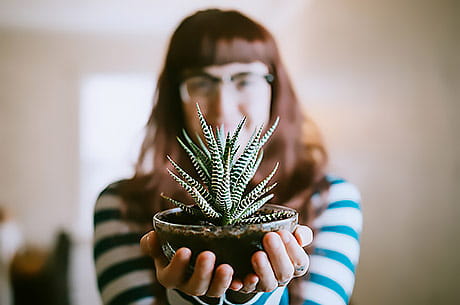3 health benefits of indoor plants
They don’t just look good — houseplants can boost your mental and physical well-being. Here’s how.
Whether you’re new to indoor gardening or you’ve been a longtime houseplant enthusiast, this hands-on hobby has some health-boosting benefits.
It’s no surprise that there’s been an uptick in indoor gardening during the COVID-19 pandemic. With many of us spending more time at home, we’re all looking for ways to spruce up our environments and occupy our free time.
“Houseplants are aesthetically pleasing, but they can make you feel good, too,” says Christina Letter, health coach at Geisinger.
3 health-boosting benefits of indoor plants
According to research, adding some houseplants to your space can help you feel healthier and happier. Here’s how:
1. They may reduce indoor air pollutants
A well-known study conducted by NASA concluded that the roots and soil of houseplants reduced cancer-causing volatile organic compounds (VOCs) in the air.
During photosynthesis, plants “inhale” carbon dioxide and “exhale” oxygen. “When plants ‘inhale’ carbon dioxide, they’re also taking in those air pollutants and releasing clean oxygen into the air,” says Letter.
While an air purifier may be the more effective choice in certain cases, if you’re looking to naturally freshen the air in your home — adding a big, leafy houseplant is a great place to start.
“Better air quality can also lead to a better night’s rest,” says Letter. “Getting quality sleep helps keep your immune system in tip-top shape, reduces your risk of heart disease and improves your memory.”
2. Plants can be therapeutic
Research has shown that working with and being around plants can help reduce psychological stress. “Like popular adult coloring books, working with plants is an activity that decreases mind wandering,” explains Letter. “This can help ease feelings of anxiety and reduce stress.”
Tending to plants has proven to be especially helpful for those with mental health conditions. In fact, horticultural therapy is often used to help increase feelings of physical and mental well-being among people who have conditions such as depression, anxiety and dementia.
“Studies also show that spending time with and in nature improves your blood pressure, your heart rate and your stress hormone levels, which benefits your physical well-being,” says Letter.
3. They can boost your mental health
Studies have shown that spending time in nature — such as taking a walk, hike or visiting a park — can help improve your mental health.
The same goes for indoor gardening. “Creating green spaces in your home can help boost your mental health,” says Letter. “Being in those green spaces can help reduce stress and improve your mood.”
In addition, the act of putting time into caring for your houseplants and watching them grow (and thrive) can create a sense of pride and accomplishment. “These feelings also lead to improved mental health and well-being,” says Letter.
Houseplants for beginners
If you’re new to indoor gardening, or worried you have a not-so-green thumb, these houseplants are easy to care for and are great for beginners:
- Pothos
- Snake plant
- Chinese evergreen
- ZZ plant
“There’s also a social aspect to indoor gardening,” says Letter. “Once you start building your collection, you can collect and exchange cuttings with family and friends.”
Things to consider before buying indoor plants
Before heading to your local nursery, it’s a good idea to do your research first. Here are some things you’ll want to consider before buying:
- Light requirements: If you don’t have a lot of bright light in your home, you may want to consider a plant that can thrive in a low-light environment.
- Watering needs: Overwatering can kill your plant, so be sure you know how much water it needs and how often you should water it. There are social forums and even apps you can download that can help.
- Pests: Houseplants can bring pests into your home. Be sure to do some research and check your plants for signs of pests, so you can act right away.
- Your commitment level: If you don’t have a lot of time to care for your houseplants, choose ones that are considered low maintenance.
“Some plants may also be dangerous to pets and children,” says Letter. “So do your research before you buy. When in doubt, place the plant where your pets or children can’t reach it.”
So, there you have it — if you’re looking for a new hobby, indoor gardening may be the right one for you. You may just reap some health benefits from it, too.
Next steps:
8 ways to improve your mental health
Thinking about trying yoga? Here are 5 health benefits
What is health coaching? Find out!





